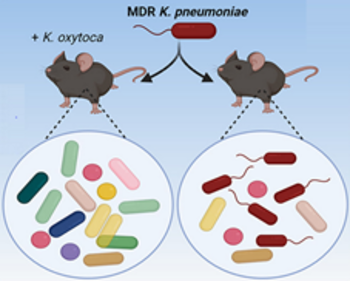Next-Generation Probiotics
Keywords
intestinal microbiota, enteric infections, Klebsiella oxytoca, Klebsiella pneumoniae, multidrug-resistant bacteria, colonization resistance, probiotics, humanized mouse models
Invention Novelty
The novel probiotic consists of special strains of Klebsiella oxytoca combined with at least three additional commensal bacteria. This probiotic composition can induce decolonization of multidrug-resistant (MDR) K. pneumoniae strains in the gut. In addition, the probiotic composition can help to establish colonization resistance by protecting the host from pathogen invasion thanks to the interaction between microbiota and pathogen. Both, decolonization and colonization resistance depend on the ability of K. oxytoca strains to use specific carbon sources and to cooperate with commensal bacteria to further occupy alternative niches of K. pneumoniae.
Value Proposition
Gut colonization with multidrug-resistant bacteria enhances the risk of bloodstream infections in susceptible individuals. Therefore, alternative methods are needed to eliminate these pathogens. The K. oxytoca probiotic composition can be used in a therapeutic approach to induce gut decolonization of MDR K. pneumoniae. Additionally, the probiotic composition can be applied in a preventive approach e.g., after antibiotic treatment to pave the way for establishing a healthy microbiome and colonization resistance. Future rationale design of probiotics will lead to compositions to prevent or treat colonization with a broad range of MDR Enteroabacteriaceae.
Technology Description
Diverse commensal K. oxytoca strains were isolated from protected individuals. These K. oxytoca strains convey protective as well as curative effects. These effects are based on K. oxytocas ability to metabolize specific carbohydrates, namely aromatic beta-glucosides, significantly better compared to MDR K. pneumoniae. Moreover, cooperation of K. oxytoca with additional commensals is required to complete the promising novel probiotic composition.
Commercial Opportunity
The technology is available for licensing and co-development.
Development Status
Preventive and therapeutic effects of K. oxytoca as a probiotic were shown in in vivo studies in mice. K. oxytoca strains were detected in protected human donors.
Patent Situation
European patent application was filed in December 2020.
Further Reading
Lisa Osbelt et al., Klebsiella oxytoca causes colonization resistance against multidrug-resistant K. pneumoniae
in the gut via cooperative carbohydrate competition, Cell Host & Microbe, 2021, doi.org/10.1016/j.chom.2021.09.003.




